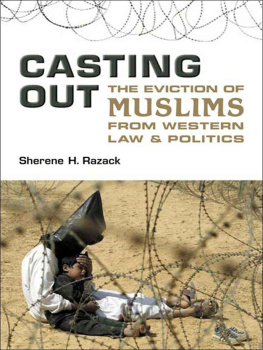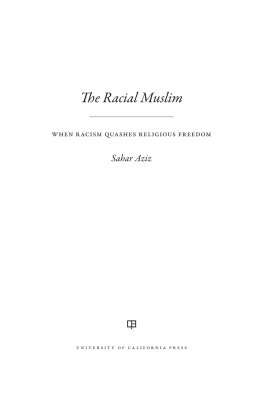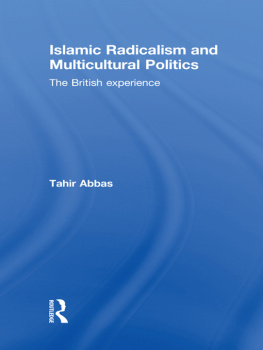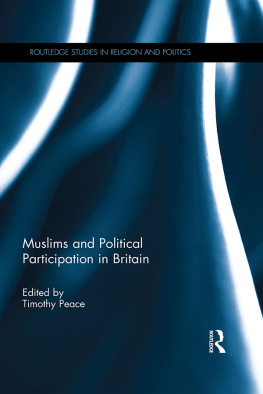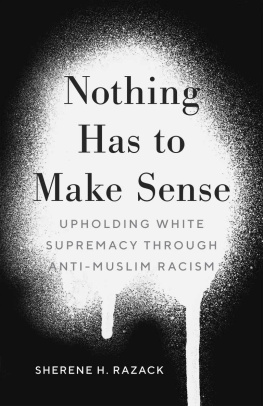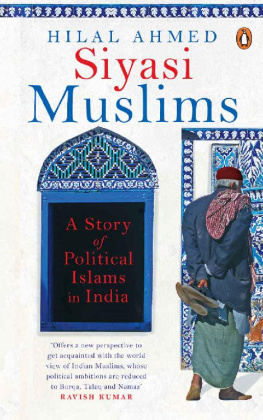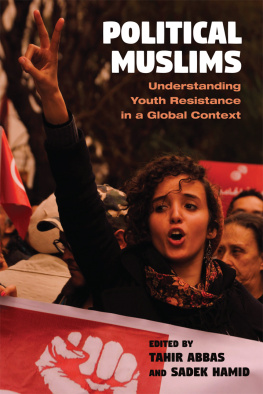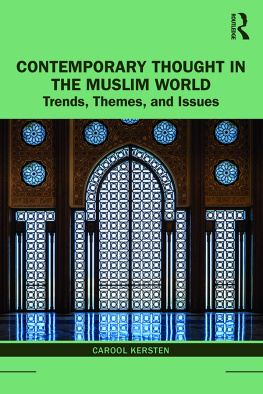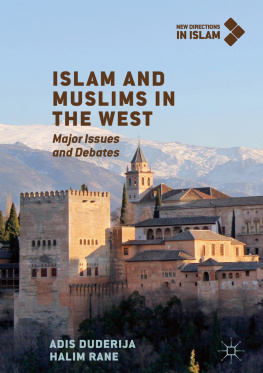CASTING OUT
The Eviction of Muslims from Western Law and Politics
Three stereotypical figures have come to represent the war on terror the dangerous Muslim man, the imperilled Muslim woman, and the civilized European. Casting Out explores the use of these characterizations in the creation of the myth of the family of democratic Western nations obliged to use political, military, and legal force to defend itself against a menacing third world population. It argues that this myth is promoted to justify the expulsion of Muslims from the political community, a process that takes the form of stigmatization, surveillance, incarceration, torture, and bombing.
In this timely and controversial work, Sherene H. Razack looks at contemporary legal and social responses to Muslims in the West and places them in historical context. She explains how race thinking, a structure of thought that divides the world between the deserving and undeserving according to racial descent, accustoms us to the idea that the suspension of rights for racialized groups is warranted in the interests of national security. She discusses many examples of the institution and implementation of exclusionary and coercive practices, including the mistreatment of security detainees, the regulation of Muslim populations in the name of protecting Muslim women, and prisoner abuse at Abu Ghraib. She explores how the denial of a common bond of humanity between European people and those of different origins has given rise to the proliferation of literal and figurative camps, places or bodies where liberties are suspended and the rule of law does not apply.
Combining rich theoretical perspectives and extensive research, Casting Out makes a major contribution to contemporary debates on race and the war on terror and their implications in areas such as law, politics, cultural studies, feminist and gender studies, and race relations.
SHERENE RAZACK is a professor in the Department of Sociology and Equity Studies in Education at the Ontario Institute for Studies in Education, University of Toronto.
SHERENE H. RAZACK
Casting Out
The Eviction of Muslims
from Western Law and Politics

University of Toronto Press Incorporated 2008
Toronto Buffalo London
Printed in Canada
ISBN 978-0-8020-9311-0 (cloth)
ISBN 978-0-8020-9497-1 (paper)

Printed on acid-free paper
Library and Archives Canada Cataloguing in Publication
Razack, Sherene
Casting out : the eviction of Muslims from western law and politics / Sherene H. Razack.
Includes bibliographical references and index.
ISBN 978-0-8020-9311-0 (bound)
ISBN 978-0-8020-9497-1 (pbk.)
1. Muslims Western countries. 2. Race discrimination Western countries. I. Title.
BP173.5.R39 2007 305.697091713 C2007-903885-9
University of Toronto Press acknowledges the financial assistance to its publishing program of the Canada Council for the Arts and the Ontario Arts Council.
University of Toronto Press acknowledges the financial support for its publishing activities of the Government of Canada through the Book Publishing Industry Development Program (BPIDP).
To my mother, Acclema
Contents
Acknowledgments
It is hard to know who not to thank for assistance with this book. I have benefited from the advice, love, and support of virtually everyone I would call a friend and family member, and from the ideas of countless colleagues, and from audiences where I presented this work. Of course, the wonderful students of the Ontario Institute for Studies in Education of the University of Toronto influenced the final version. Perhaps it is a good idea to start with research assistance and to confess that I have had extraordinary research assistants without whom I could not get along. Time and time again, Carmela Murdocca, Gada Mahrouse, and Leslie Thielen Wilson have offered me the best of themselves, and I am deeply grateful. To Leslie, I extend a special thanks for saving me from myself when I thought the sky was falling and for never failing in her enthusiasm for the project. Honor Ford Smith, Amina Jamal, and Homa Hoodfar were always willing to listen and to theorize about what has been happening to Muslims since 9/11. Barbara Buckman, Donna Jeffery, Sheryl Nestel, Helene Moussa, and Ruth Roach Pierson encouraged me in times of crisis. My family are always the ground on which I stand to write. I thank them for material and emotional support and for inspiring me with their own capacity to work hard and to care. Lots of love goes to Larry, Ben, and Ilya and to my siblings, nieces, and nephews. This book was always a collective family project discussed over many meals. I dedicate it to my dearest mother, who showed me early on all the things a Muslim woman can be. Her unshakeable belief that her children are special is the best gift she gives, and I want to thank her for it and for the privilege of growing up with a hard-working, loving, and above all joyous mother who loves cricket and hockey games and going to the beach as much as she loves going to the mosque.
I owe Sharry Aitkin, Barbara Jackman, Andrew Brouwer, John Norris, Kike Roach, and the African Canadian Legal Clinic a special debt for sharing their insight and materials and for supporting the research on security certificates, my colleague Megan Boler for reading a draft of the working paper, and Laura Gomez for helping me to get the work out. Kari Dehli, Anja Bredal, Nita Kapoor, and Rachel Paul were of considerable help for research on the Norwegian context, and Ulla Johanson translated Norwegian texts. The Social Sciences and Humanities Research Council supported the book with a grant for which I am grateful. Versions of these chapters appeared in the following journals and I am grateful for permission to reproduce them: Canadian Journal of Women and the Law, Feminist Legal Studies, Social Justice Review, and Studies in Law, Politics and Society.
CASTING OUT
The Eviction of Muslims from Western Law and Politics
Introduction: Race Thinking and the Camp
That colonies might be ruled over in absolute lawlessness stems from the racial denial of any common bond between the conqueror and the native.
Achille Mbembe
The state of exception is an anomic space in which what is at stake is a force of law without law (which therefore should be written: force of law ).
Giorgio Agamben
A Typical Month in the War on Terror in Canada
In the month of June 2006, there were terror sweeps of seventeen young Muslim men in Toronto who were allegedly planning to blow up the CN Tower and the headquarters of Canadas security services. The young men, five of whom are teenagers, were brought to the courtroom in leg irons, surrounded by the heavy presence of police snipers, a spectacle of dangerous Muslim men whose meaning few could fail to grasp. Uncharacteristically naming race, Canadian newspapers covering the June terror arrests openly referred to Muslims as brown-skinned and were at pains to make the distinction between those who were merely Canadian-born, as the seventeen accused are, and those who are truly Canadian by virtue of possessing Canadian values, if not Canadian skin. Few reporters bothered to consider the presumption of innocence. At the same time as four hundred Royal Canadian Mounted Police officers in battle fatigues were engaged in arresting the seventeen young men, the Supreme Court was getting ready to hear challenges to the constitutionality of security certificates, a legal mechanism contained in the
Next page
